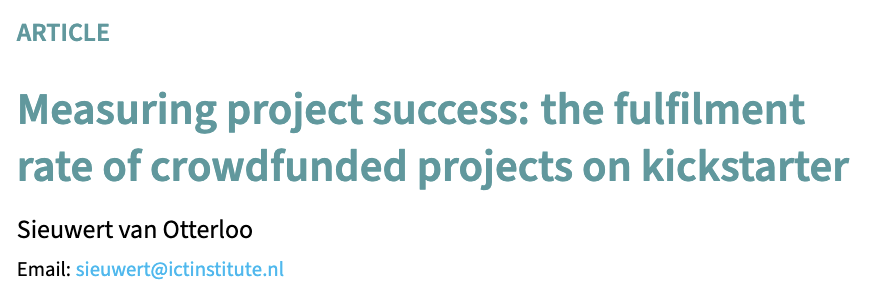Measuring project success: the fulfilment rate of crowdfunded projects on Kickstarter
| Sieuwert van Otterloo |
Project Management

van Otterloo, S. 2022. Measuring project success: the fulfilment rate of crowdfunded projects on Kickstarter, Computers and Society Research Journal (2022).
Email: sieuwert@ictinstitute.nl
DOI: https://doi.org/10.54822/SVLM1832
Abstract
Crowdfunding through platforms like Kickstarter is a common way to finance development projects for innovative products. These projects have a risk of failure that is not always communicated clearly to the people providing the money (backers). In this paper data from 35 crowdfunded projects is collected and analysed. It is used to estimate the probability that projects deliver the promised rewards to the backers, also known at the delivery rate or fulfillment rate. The results show that approximately 30 percent of projects are fulfilled or delivered on time or with less than six month delay. 40 percent of projects fail to delivery anything. This is in line with data about other IT projects. There are no significant relations between known project characteristics and the delivery status. The paper concludes with recommendations for crowdfunding platforms on how to improve transparency.
Main results
The main result of the paper is an accurate estimate on what the probability is that crowdfunded projects are successful in delivering the promised rewards (the so-called delivery status). It is difficult to determine the delivery status of projects since this information is not listed on the campaign page. The analysis from this paper shows that the success rate and failure rate of crowdfunded technology projects is similar to software projects in general. About one third of projects fails completely and dies not deliver anything, while only one third of projects is completely successful.
The data can be used to correlate the delivery status with various project characteristics. This is for instance done in the scatter plots below.
Acknowledgements
This paper has benefited from the results of thesis research by Gijs van dongen, Stan Eveleens and Jasser Bakridi at the Vrije Universiteit Amsterdam between 2018 and 2022 and from analysis by Suzanne Atkins in 2022. We would like to thank Gijs, Stan and Jasser for their research effort and the pleasant collaboration.
Download full paper in PDF
The full paper can be downloaded here: CSRJ-Otterloo-2022-4-Measuring project success-crowdfunding-kickstarter.pdf. This paper is published in the “Computer and Society Research Journal“, a free to publish, open access journal for socially relevant computer science research.
Data Set
We assessed the project management strategies of 35 fully-funded Kickstarter projects launched in 2018. The data was collected in early 2022. From the Kickstarter pages of individual projects, we acquired the following information:
- Funding target;
- Funding raised (all projects met their target, many exceeded it);
- Number of backers;
- Estimated delivery date;
- Planned project duration;
- Actual delivery date; This was determined by studying the updates and comments on the kickstarter campaign page
- Retail price;
- Team size;
- Number of earlier Kickstarter projects that the team has managed;
- Planning steps given;
- Number of words in the project risk assessment.
Our data set is available to download. Additionally, their is a dataset containing one hundred crowdfunded video game projects as well.
How to cite this paper and data set
We recommend you to use the following code to cite the paper:
@article{Otterloo2022,
title={Measuring project success: the fulfilment rate of crowdfunded projects on Kickstarter},
author={van Otterloo, S.},
journal={Computers and Society Research Journal},
number={4},
year={2022}},
note = {\url{https://doi.org/10.54822/SVLM1832}}
}
It should look similar to this, depending on your template:
van Otterloo, 2022. Measuring project success: the fulfilment rate of crowdfunded projects on kickstarter, Computers and Society Research Journal (2022), 4, https://doi.org/10.54822/SVLM1832
Dr. Sieuwert van Otterloo is a court-certified IT expert with interests in agile, security, software research and IT-contracts. He is a also an ISO 27001 and NEN 7510 auditor and AI researcher.



